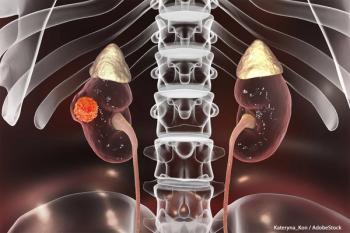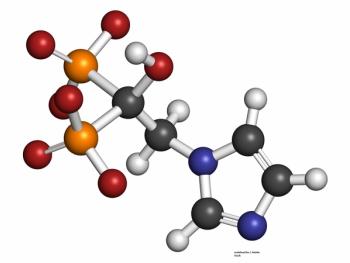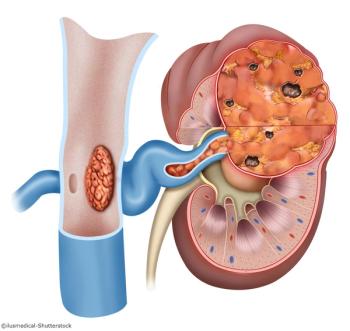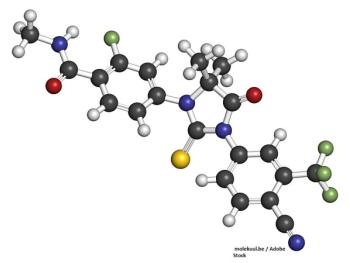
Elizabeth Plimack, MD, MS, discussed the depth of response for patients included in the KEYNOTE-426 trial investigating axitinib and pembrolizumab over sunitinib for patients with advanced renal cell carcinoma.

Your AI-Trained Oncology Knowledge Connection!


Elizabeth Plimack, MD, MS, discussed the depth of response for patients included in the KEYNOTE-426 trial investigating axitinib and pembrolizumab over sunitinib for patients with advanced renal cell carcinoma.

The Seattle Cancer Care Alliance Expert offered background on the first-line use of pembrolizumab monotherapy in advanced clear cell renal cell carcinoma.

Elizabeth Plimack, MD, MS, discussed the role of subsequent immunotherapy when analyzing the primary endpoint of overall survival for axitinib and pembrolizumab over sunitinib in patients with advanced renal cell carcinoma evaluated in the updated analysis of KEYNOTE-426.

The Carolina Urologic Research Center expert discusses the benefits of oral relugolix for patients with prostate cancer.

An analysis of the secondary endpoint of the phase III CONDOR study showed PSMA scans had a profound impact on patient care.

The MD Anderson Cancer Center expert discussed next steps for those with von Hippel-Lindau disease–associated renal cell carcinoma being treated with the HIF-2a Inhibitor.

The expert from the University of California San Diego discusses the importance of the findings presented at the 2020 ASCO Virtual Scientific Program

Final data analysis of SPARTAN trial demonstrates large benefit in overall survival when compared with ADT plus placebo.

Baseline CTC counts were shown to be strong indicators for subsequent therapy response and 2-year progression-free survival.

The results suggested the potential for this agent to become a new standard for T-suppression in this patient population.

The HIF-2a Inhibitor, MK-6482, induced clinical responses among patients with von Hippel-Lindau disease–associated renal cell carcinoma.

The results, presented at the 2020 ASCO Virtual Scientific Program, found that in men with metastatic castration resistant prostate cancer who were previously treated with docetaxel, 177Lu-PSMA-617 (LuPSMA) was more active than cabazitaxel.

When compared with sorafenib, tivozanib showed improved progression-free survival, and a more manageable safety profile for patients with relapsed or refractory metastatic renal cell carcinoma.

A phase III study presented the 2020 ASCO Virtual Scientific Program showed encouraging efficacy data suggesting savolitinib could be used to treat patients with MET-driven papillary renal cell carcinoma.

An interim analysis of the CheckMate 920 phase IIIb/IV trial evaluated nivolumab plus ipilimumab in advanced renal cell carcinoma patients with brain metastases.

The KEYNOTE-426 study evaluated pembrolizumab plus axitinib vs sunitinib in patients with metastatic RCC with intermediate/poor risk disease and those with sarcomatoid features.

In this randomized phase III trial, researchers compared cytoreductive nephrectomy vs sunitinib alone in patients with metastatic renal cell carcinoma.

The phase II IMmotion150 study evaluated disease- and treatment-related symptoms in RCC patients receiving atezolizumab alone or in combination with bevacizumab vs sunitinib.

Findings from a planned subanalysis of IMmotion151 looked at combination atezolizumab and bevacizumab in patients with RCC and sarcomatoid histology.

The TAXOMET trial tested the addition of metformin to docetaxel and prednisone in patients with metastatic castration-resistant prostate cancer.

Researchers tested the administration of bone-targeted agents once every 12 weeks vs once every 4 weeks for a year in patients with metastatic castration-resistant prostate cancer.

The study of sequential treatment of pazopanib followed by nivolumab in advanced or metastatic renal cell carcinoma looked at benefit-risk profile and survival.

Researchers tested treatment with bone-protecting agents in men with metastatic castration-resistant prostate cancer treated with enzalutamide or radium-223.

A pilot study evaluated cytoreductive surgery combined with immune checkpoint therapy in patients with metastatic renal cell carcinoma.

The study investigators evaluated the survival benefit of pazopanib in metastatic renal cell carcinoma patients with no evidence of disease after metastasectomy.

Progression-free survival was compared for the VEGF TKI tivozanib vs sorafenib across multiple subgroups of refractory advanced renal cell carcinoma.

The phase III ENZAMET study showed 'practice-changing' results with enzalutamide for men with metastatic hormone-sensitive prostate cancer.

The TOPARP-B study showed that olaparib had activity in patients with metastatic castration-resistant prostate cancer with DNA damage repair gene defects.

The researchers compared hormonotherapy plus radiotherapy vs radiotherapy alone in prostate cancer patients who previously underwent radical prostatectomy.

Researchers tested the androgen receptor inhibitor apalutamide plus ADT in patients with metastatic castration-sensitive prostate cancer.